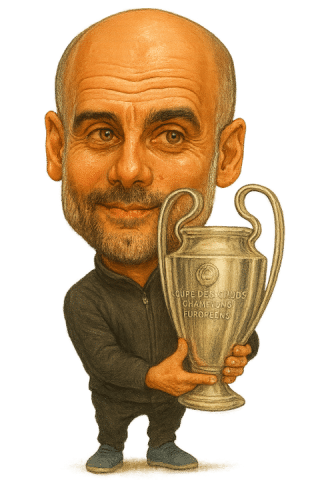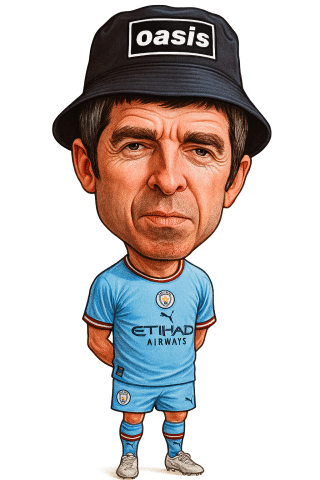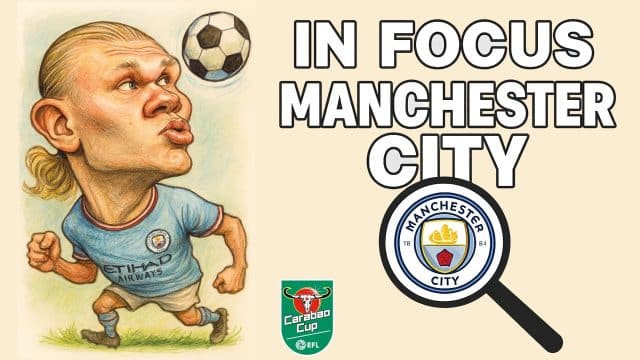The lights will be on, the cameras rolling, and the stakes quietly simmering as Swansea City welcome Manchester City to the Swansea.com Stadium this Wednesday evening. It’s not just another cup tie. It’s the latest instalment in our “In Focus” series, where we take a deeper look at the clubs who stand between us and the next chapter in our footballing journey.
Manchester City arrive with their usual entourage of expectation, precision, and star power. But beneath the surface of their polished machine lies a flicker of doubt. A sense that this season, the margins are tighter, the distractions louder, and the pressure heavier. For Pep Guardiola’s men, this fixture might be filed under routine. For the Swans, it’s a chance to disrupt rhythm, rewrite narratives, and maybe, just maybe, remind the footballing world that cup magic still lives in SA1.
Over the next few sections, we’ll unpack the Manchester City story: their rise, their manager, their mindset, and their memories of a certain FA Cup night in 2019. We’ll hear from a City fan who’s not entirely convinced, meet the man in the middle, and offer our own prediction for how this one might unfold.
It’s Manchester City in focus. And it starts now.
🏙️ Who Are Manchester City?
Manchester City Football Club began life in 1880 as St. Mark’s (West Gorton), a church team formed to tackle social issues in East Manchester. By 1894, they had adopted the name Manchester City and started building a reputation that would eventually span continents and trophy cabinets alike.
City’s early years were a mix of promise and scandal. They won their first major honour in 1904, lifting the FA Cup, but were soon rocked by financial irregularities that saw 17 players suspended, including star man Billy Meredith, who promptly crossed the divide to Manchester United. The club moved to Maine Road in 1923, where they stayed for 80 years before relocating to the Etihad Stadium in 2003.
rocked by financial irregularities that saw 17 players suspended, including star man Billy Meredith, who promptly crossed the divide to Manchester United. The club moved to Maine Road in 1923, where they stayed for 80 years before relocating to the Etihad Stadium in 2003.
Historically, City were known for their unpredictability. They became the only English champions ever to be relegated the following season, a feat that still stings in football folklore. But the modern era has rewritten their narrative. Since the turn of the millennium, and especially following the 2008 takeover by the Abu Dhabi United Group, Manchester City have transformed into a global powerhouse. Ten league titles, seven FA Cups, eight League Cups, and a UEFA Champions League crown in 2023 now sit in their honours list.
Today, City are synonymous with possession football, tactical precision, and relentless domestic dominance. But for all their silverware, the club’s identity remains rooted in a city that lives and breathes football, and in a fanbase that remembers the chaos before the control.
💰 The Golden Years: Life Changes in a Sheikh
In September 2008, Manchester City changed forever. The club was bought by Sheikh Mansour bin Zayed Al Nahyan, a member of the Abu Dhabi royal family, and with that came a level of investment English football had never seen. Overnight, City went from mid-table uncertainty to a project of global ambition. The money flowed, the players followed, and the trophies began to stack up.
The transformation was swift. Robinho arrived from Real Madrid on deadline day, signalling intent. Within a few seasons, the likes of Sergio Agüero, David Silva, Yaya Touré, and Vincent Kompany had turned City into title contenders. The 2011–12 Premier League win, sealed by Agüero’s last-gasp goal against QPR, became the defining moment of the new era. Since then, City have added multiple league titles, domestic cups, and finally, the elusive Champions League in 2023.
But not everyone has embraced the change. Critics point to the club’s financial muscle, questioning the fairness of their rise and the implications for competitive balance. Others lament the loss of the old City, the chaotic, lovable underdogs who could beat anyone and lose to anyone. For some fans, the soul of the club has evolved into something more polished, more corporate, and less raw.
Still, for many, these are the golden years. The Etihad is full, the football is sublime, and the silverware keeps coming. Manchester City are no longer chasing dreams. They are setting the standard.
🕰️ That FA Cup Game
March 16, 2019. The Liberty Stadium. Swansea City 2, Manchester City 3. But that scoreline only tells half the story.
Swansea were electric in the first half. A composed Matt Grimes penalty and a flowing finish from Bersant Celina gave the Swans a 2–0 lead against the reigning Premier League champions. The crowd believed. The upset was on.
Then came the controversy. Bernardo Silva pulled one back with a crisp strike, but the equaliser was steeped in injustice. Cameron Carter-Vickers was judged to have fouled Raheem Sterling in the box. Replays showed minimal contact, and with no VAR in use at the Liberty, the penalty stood. Sergio Agüero’s effort deflected off Kristoffer Nordfeldt and was recorded as an own goal. Minutes later, Agüero headed in the winner from an offside position. Again, no VAR. Again, no reversal.
The fallout was immediate. Fans, pundits, and even Pep Guardiola acknowledged the officiating had shaped the result. Swansea had played with bravery and style, only to be undone by decisions that would have been overturned in a Premier League ground.
City went on to win the FA Cup that year. But in Swansea, that night remains a sore point. It was a performance worthy of glory, denied by the absence of technology and the presence of injustice.
🧠 The Manager: Pep Guardiola
Pep Guardiola is not just a manager. He is a footballing ideologue, a tactical architect, and a serial winner whose influence stretches far beyond the touchline. Born in Santpedor, Spain, in 1971, Guardiola first made his mark as a cerebral midfielder under Johan Cruyff in Barcelona’s iconic Dream Team. He captained the side and absorbed the principles of positional play, pressing, and possession that would later define his managerial style.
In 2008, Guardiola took charge of Barcelona’s first team after a successful stint with the B side. What followed was a revolution. In his debut season, he won the treble — La Liga, Copa del Rey, and the UEFA Champions League — becoming the youngest manager to lift Europe’s top prize. Over four seasons, he collected 14 trophies, including three league titles and two Champions League crowns. His Barcelona team, built around Lionel Messi, Xavi, and Andrés Iniesta, is widely regarded as one of the greatest in football history.
Guardiola moved to Bayern Munich in 2013, where he won three consecutive Bundesliga titles and two DFB-Pokal cups. Though he did not win the Champions League in Germany, his tactical innovations, including inverted full-backs and fluid midfield rotations, reshaped how elite teams approached possession and space.
Since joining Manchester City in 2016, Guardiola has turned the club into a domestic juggernaut. Six Premier League titles, two FA Cups, four League Cups, and the long-awaited Champions League triumph in 2023 have cemented his legacy. His City sides have broken records for points, goals, and winning streaks, all while playing a brand of football that is both ruthless and beautiful.
Guardiola demands control, precision, and total commitment. He is a perfectionist who reinvents his teams season after season, always searching for the next edge. Whether admired or criticised, his impact on the modern game is undeniable. He has not just won. He has changed how football is played.
👀 The Etihad Eye: Noel from Manchester

Noel is a City fan. Not that Noel. This one’s from Hulme, works in logistics, and has followed Manchester City since the Maine Road days. He’s seen the lean years, the lottery wins, and the Guardiola era in full swing. But ask him about this week’s cup tie in Swansea, and you’ll get a shrug.
“It’s not that I don’t care,” he says. “It’s just… we’ve got bigger things to worry about.”
Noel’s focus, like many City fans this season, is firmly on reclaiming the Premier League. After missing out on the Champions League last year, knocked out by Real Madrid in the quarter-finals, the hunger has shifted. Arsenal are pushing, Liverpool are lurking, and Pep’s rotation policy is starting to raise eyebrows.
“Sometimes it feels like he’s overthinking it again,” Noel says. “Tinkering with the back line, playing midfielders at full-back, resting Haaland when we need a goal. I get it, he’s a genius, but it’s frustrating when it costs us points.”
As for Wednesday night?
“We’ll win. Probably. But if we don’t, I won’t lose sleep. The cup’s nice, but the league is everything this year. We can’t let Arsenal nick it.”
Noel expects a professional job, a rotated side, and a result. But he won’t be glued to the screen. For him, this one’s background noise in a season where the volume is cranked elsewhere.
🧍♂️ The Man in the Middle: Simon Hooper
Simon Hooper will take charge of Wednesday night’s Carabao Cup clash between Swansea City and Manchester City at the Swansea.com Stadium. A familiar figure to Swans fans, Hooper has officiated 11 Swansea matches across league and cup competitions, including nine at home. His record? Mixed but respectable — four wins, four draws, three defeats.
Hooper was promoted to the Select Group 1 of referees in 2018 and has since become a regular in Premier League fixtures. His style is steady, often letting play flow, though he’s been at the centre of several high-profile VAR controversies in recent seasons. That won’t be a factor here — VAR is not in use for Carabao Cup ties at EFL grounds, meaning all decisions will rest with Hooper and his assistants.
Swansea fans may recall his handling of the 2022 FA Cup tie against Southampton, a 3–2 defeat that saw extra time and a few contentious calls. He also oversaw the 2–1 win over West Brom in 2021 and the 2–0 victory against Norwich earlier that year — both strong performances under his watch
With no video review and a heavyweight opponent in town, Hooper’s judgment will be under scrutiny. The hope in Swansea is simple: a fair game, a firm grip, and no headlines about the man in black.
🔮 Prediction: Swansea City 1, Manchester City 2
This won’t be a stroll. Manchester City will bring depth, control, and their usual rhythm. But Swansea will bring urgency, belief, and a crowd that knows when to rise.
Expect City to dominate the ball but not the mood. The Swans will press in bursts, frustrate in phases, and look for moments where the game tilts. A loose pass. A lapse in shape. A corner that lands just right. These are the margins where cup ties live.
City’s quality should see them through. But this is not a fixture they’ll enjoy. It’s a midweek test in a stadium that remembers injustice and thrives on defiance. If Swansea score first, the tone shifts. If they hold firm, the tension builds. And if they dare to dream, the script might just fray.
Final score: Swansea City 1, Manchester City 2. Earned, not gifted. And it won’t be forgotten.
🏁 Final Whistle
And so it comes to this. Swansea City versus Manchester City under the lights at the Swansea.com Stadium — a fixture that might not shake the footballing world, but could stir something far more important: belief.
For Manchester City, this is a checkpoint. A midweek obligation in a season packed with expectation. They’ll rotate, recalibrate, and aim to dispatch the Swans with minimal fuss. But even the most well-oiled machines can stall when the setting shifts. And this setting — a tight ground, a vocal crowd, a team with nothing to lose — is built for disruption.
For Swansea, it’s a chance to test their mettle. To measure themselves against the best. To remind their fans, and perhaps themselves, that the gap between leagues doesn’t always mean a gap in spirit. They’ve done it before. They nearly did it in 2019. And while the names have changed, the hunger hasn’t.
This isn’t just about tactics or talent. It’s about moments. A tackle that lifts the crowd. A run that breaks the line. A goal that defies the odds. These are the ingredients of cup nights that linger long after the final whistle.
City should win. But Swansea could make them work for it. And if they do, this won’t be remembered as a routine result. It’ll be remembered as a night when the underdogs bit back, even if only for a while.
Whatever happens, we’ll be watching. And we’ll be ready to write the next chapter.

This article first appeared on JACKARMY.net.

